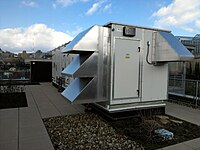
Photo from wikipedia
Abstract The supply of heat for fish farms, especially during off-season production, is necessary for the establishment of commercial aquaculture. For this purpose, research was carried out on the supply… Click to show full abstract
Abstract The supply of heat for fish farms, especially during off-season production, is necessary for the establishment of commercial aquaculture. For this purpose, research was carried out on the supply of heating ener to a rainbow trout farm (cold water fish) using a waste heat recovery system in the city of Meshgin in Ardabil province. The study area has 20 indoor pools and 14 unguarded pools. The 14 pools that are in the indoor area, are used for this study. Seven pools of these 14 pools were at high altitude and other 7 pools were at low altitude. After collection of the temperature data for waste water ponds that had provided optimum temperature conditions in the off-season using geothermal fluid, three modes for waste heat recovery were designed according to the thermal, flow and physicochemical properties of the waste pond. In the first mode, the output of the first seven pools and the second seven pools were combined and the fluid flow rate reached to 24.92 L/sec. In the second mode, the output of the second seven pools (8.15 L/sec) was used to recover heat, and in the third case, the output of the first seven pools (at high-altitude pools and with the flow rate of 16.77 L/sec) was used to recover heat. After obtaining technical approval and determining the economic value of each component of the waste heat recovery circuit from specialized companies in Iran, the proposed systems were analyzed theoretically with COMSOL software. Because there was no equal rate of flow, velocity or geometry for comparison between the optimum state in the theoretical conditions of practice, the temperature differences between the input hot water and output cold water were used for all three modes of heat recovery. Technically, the results indicate that the second mode is best in both the theoretical and practical modes of the waste heat recovery circuit. The first mode recovery system had the smallest temperature difference between the hot water inlet and cold water outlet. Economically, the minimum cost of establishing a heat recovery system was for the second mode, with a decrease of 60.65% and 38.83% compared to the third and first modes, respectively. Considering technical and economic factors, the waste heat recovery system of the second mode was the most appropriate choice for the trout farm, both theoretically and practically. The first and third modes ranked next, respectively.
Journal Title: Aquacultural Engineering
Year Published: 2019
Link to full text (if available)
Share on Social Media: Sign Up to like & get
recommendations!